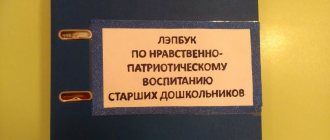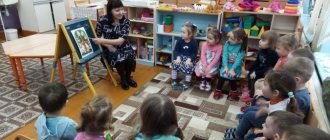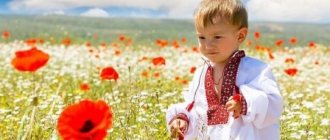Long-term work plan for the moral and patriotic education of children in the preparatory group
Sadchikova Nadezhda
Long-term work plan for the moral and patriotic education of children in the preparatory group
Long-term work plan for the moral and patriotic education of children in the preparatory group
Author: Sadchikova Nadezhda Valentinovna
Organization: MBOU "Secondary School" No. 1
Locality: Kirsanov
Objectives of moral and patriotic education :
* To cultivate in children love and affection for family, home, small homeland.
*To form basic knowledge about human rights, to cultivate high moral feelings , humanism, and respect for the traditions of other peoples.
*Consolidate knowledge about the symbols of the state (coat of arms, flag, anthem)
.
*Develop interest in Russian traditions.
*develop a caring attitude towards nature and all living things.
*Expand children's knowledge about Russia , develop a sense of pride for their Motherland and people.
*Cultivate respect for work.
*Expand your understanding of Russian cities.
September
1. Entertainment “Day of Knowledge”
Goal: to give children the idea that everyone needs knowledge, a book is a source of knowledge, school.
2. Lesson “Me and my rights”
Goal: continue to introduce children to the Convention on the Rights of the Child (in an accessible form)
3. Drawing “The house where I live”
Goal: to make children want to reflect in their drawings their love for their home and respect for family members.
4. Conversations with children about household responsibilities, family traditions and holidays.
Goal: to form ideas about family traditions and holidays, to develop a sense of pride in your family.
5. Role-playing game “Family”
Goal: to develop the ability to play in joint activities.
6. Lesson “My Family”
Goal: to form an idea of the composition of the family, to cultivate love and respect for loved ones.
7. Exhibition of drawings on the theme “My Small Motherland”
Goal: consolidate knowledge about the sights of the city, cultivate love for your hometown.
8. Conversation “Calling Mom at Work ”
Goal: to form the basics of etiquette.
October
1. Tour of the kindergarten.
Goal: to introduce children to the premises and staff of the kindergarten.
2. Conversation about the importance of the work of all people working in kindergarten .
children’s knowledge there are many people working in kindergarten who care about them, to cultivate respect for kindergarten employees.
3. Lesson “Our kindergarten”
Goal: consolidate, deepen, expand knowledge about the work of a teacher . Assistant teacher , cook, doctor.
4. Exhibition of joint creativity between parents and children on the theme “Autumn Fantasy”
Goal: to cultivate in children and parents a desire to invent and create something together.
5. Lesson “Let's play together”
Goal: to clarify children’s about a friendly attitude towards peers, about the need to play together.
6. Singing songs and reading poems about kindergarten.
Goal: to develop children's .
7. Conversation “Gifts of Nature”
Goal: expand children's of the benefits of vegetables and fruits; show the importance of bread in people's lives; cultivate respect for work .
8. Entertainment “Autumn Gatherings”
Goal: fostering a love for Russian culture, developing interest in peasant life and Russian folklore.
November
1. Conversation “Tell me where you live”
Goal: expand children’s knowledge about their hometown , develop communication skills.
2. Lesson “Russian Independence Day”
Goal: to consolidate children’s about the history of the holiday; introduce monuments dedicated to these events; foster a sense of pride in your people.
3. Conversation “Whoever wishes good for people gets it himself”
Goal: to promote the development of the ability to guess the feelings and mood of another person.
4. Lesson “National Flag of the Russian Federation”
.
Purpose: to introduce the state flag, the purpose, symbolism of the colors and their relative positions.
5. Conversation “Nature of Russia”
.
Goal: to form children’s of the beauty of Russia’s nature, to cultivate a sense of pride that they live in such a beautiful country.
6. Lesson “National Anthem of Russia”
Purpose: to introduce the Russian national anthem. Tell about its origin and content.
7. Entertainment “Mom, you are the best in the world”
Goal: to instill a feeling of love and care for mother.
8. Photo exhibition “I love my grandmother very much, I love my mother’s mother”
Goal: to cultivate a desire to take care of your grandmother, be proud of and love her.
December
1. Conversation “The laws by which we live”
.
Goal: Continue to introduce children to the concept of “Constitution”
, expand their knowledge about the rights and responsibilities of the child.
2. Reading the fairy tale by D. Rodari “The Adventures of Chipolino”
.
Goal: talk with children about the fairness of the fairy-tale state.
3. Conversation “What is good and what is bad”
Goal: to reveal to children the meaning of the words “impossible”
,
“can”
,
“should”
, learn to evaluate actions.
4. The teacher’s about the New Year’s Eve and an imaginary journey on the map.
Goal: to expand children’s about New Year’s symbols and New Year’s customs.
5 Conducting the “Winter Craft”
Goal: to encourage children and parents to invent and create something together.
6. Decorating the group for the holiday .
Goal: To create a desire for everyone to decorate the group and work together.
7. Making New Year's gifts
Goal: to instill a desire to take care of family and friends.
8. Holiday "New Year's Carnival"
Goal: to make children want to celebrate together, to create a joyful mood.
January
1. Lesson “Folk holidays in Russia. Christmas"
Purpose: to introduce the tradition of celebrating the Orthodox holiday of the Nativity of Christ; cultivate interest in national traditions; expand children's about folk holidays in Russia.
2. Entertainment “Carol has come to visit”
Goal: to cultivate interest in Russian folk holidays.
3. Lesson “Green Light School”
Goal: to cultivate a culture of behavior on the street and in transport.
4. Conversation “Winter-winter”
.
Goal: to expand children’s about winter seasonal changes and winter fun.
5. Exhibition of drawings “Winter Holidays”
.
Goal: to arouse in children a desire to reflect their impressions in drawings, to cultivate love and respect for national holidays.
6. Conversation “Birch tree - a symbol of Russia”
Goal: to cultivate a desire to learn more about the symbol of Russia, the Russian birch, to instill love for the Motherland.
7. Conversation “Day of lifting the siege of Leningrad”
Goal: to consolidate knowledge about the heroic victory of Leningraders during the days of the siege.
February
1. Conversation “We are all different, but we are all equal”
.
Goal: to expand children’s about people of different nationalities living in Russia; work on the concept of “citizen”
, introduce the national holidays of different peoples.
2. Examination of Vasnetsov’s painting “Three Heroes”
Goal: broadening your horizons.
3. Listening to the recording of epics about Ilya Muromets, Nikita Kozhemyak.
Goal: to continue to consolidate knowledge about the exploits of Russian heroes.
4. Conversation “My friends”
Goal: to form in children the concept that people are not alike, but are all equal; to instill in children respect and tolerance for people, regardless of their social origin, appearance, or physical disabilities.
5. Lesson “Our Army”
.
Goal: to continue to expand children's understanding of the Russian Army ; consolidate knowledge about military professions, instill respect for people of these professions.
6. Entertainment “Dad and I are Russian heroes”
Goal: develop speed, strength, endurance, attention.
7. Making gifts for fathers and grandfathers.
Goal: to instill an attentive, caring attitude towards loved ones.
8. Photo exhibition “Portrait of the Pope”
.
Goal: to give a good mood.
March
1. Maslenitsa
.
Goal: to cultivate interest in Russian folk holidays, interest in the history of Russia, and national pride.
2. Lesson “All kinds of mothers are needed, all kinds of mothers are important”
.
Goal: to cultivate a kind , caring attitude towards mother, the desire to help her.
3. Exhibition of children's drawings “Beloved Mommy, My Mommy”
.
Goal: to instill a feeling of love for mother, taking care of her.
4. Making gifts for mothers and grandmothers.
Goal: to instill a desire to give gifts to family and friends.
5. Entertainment “March 8th is the holiday of all women”
.
Goal: to cultivate a desire to congratulate all women on this wonderful holiday.
6. Role-playing game “Mothers and Daughters”
.
Goal: to promote the emergence of games on themes from the surrounding life, the ability to play in a team, and distribute roles.
7. Russian folk game “Ladushki visiting grandma”
.
Goal: to continue to form in children the concept of Russian folklore: songs, games, nursery rhymes; cultivate interest in oral folk art.
8. Lesson “Walk through the spring forest”
.
Goal: to cultivate a love for nature , for birds, and a desire to take care of it.
April
1. Lesson “Conquest of space”
.
Purpose: to give an idea of outer space, about the star - the Sun, about the earth's satellite - the Moon, to teach to fantasize and dream.
2. Conversation “Our cosmonauts”
.
Goal: to continue to introduce the profession of an astronaut (watching a video, to cultivate love and respect for this dangerous and difficult profession.
3. Sports entertainment “We are astronauts”
.
Goal: to develop children's agility , speed and endurance.
4. Lesson “The Earth is our common home”
.
Goal: to continue to acquaint children with the fact that there are many countries and many different peoples on Earth, that everyone should live in peace and harmony.
5. Entertainment “Spring Gatherings”
.
Goal: to develop interest in the culture and folklore of the Russian people.
6. Conversation about school, excursion to school.
Goal: expand children's knowledge about school , create a desire to learn.
7. Lesson “Easter Holiday”
.
Goal: to develop interest in the culture of your people; develop the ability to apply knowledge about national culture in various activities.
May
1. Conversation “Spring and Labor Festival”
.
Goal: expand and deepen knowledge about this holiday.
2. Thematic lesson “Victory Day”
Goal: to continue to acquaint children with the exploits of soldiers during the Great Patriotic War; to form patriotic feelings, remember which streets in St. Petersburg are named in honor of the heroes of the Great Patriotic War.
3. Excursion and laying flowers at the memorial.
Purpose: memory and respect.
4. Conversation “Russia is united and invincible”
Goal: to cultivate interest and respect for the historical past.
5. Lesson “City Day”
.
Purpose: to introduce the history of the city; develop the ability to understand the connection between “past and present”
.
6. Examination of illustrations depicting the most famous places in the city or region.
Goal: to instill interest and love for one’s hometown and region.
7. Exhibition of children's drawings “My favorite place in the city”
8. Graduation party “Goodbye, kindergarten!”
Goal: to cultivate in children a desire to play and have fun with their peers and parents.
List of used literature:
1. Program “From birth to school”
edited by N. E. Veraksa, T. S. Komarova, M. A. Vasilyeva.
2. A. Ya. Vetokhina “ Moral and patriotic education of preschool children”
3. L. P. Ushakova “Patriotic education of preschool children. Familiarization with the events of the Military War of 1941-1945"
4. I. A. Lykova “Art activities in kindergarten”
(
preparatory group ) 5. O. A. Skorolupova “Conquest of space”
Preparatory group. Senior preschool age. Children 6-7 years old
Short-term educational and patriotic project “Your feat is not forgotten, soldier” for children of senior preschool age
Prepared by teacher : teacher Tarasenko MBDOU No. 6 “Smile”
Proletarsk, Rostov region Problem: Every year the events of the Great Patriotic War move further and further from us.
The younger generation does not perceive the events of those distant times with the same...
Pedagogical project “Formation of elementary ideas about their small Motherland in children 5–6 years old”
Pedagogical project “Formation of elementary ideas about my small Motherland in children 5-6 years old. Preschool age is the foundation of a child’s overall development. Children of this age are very inquisitive, responsive, receptive , they easily respond to all initiatives, sincerely...



